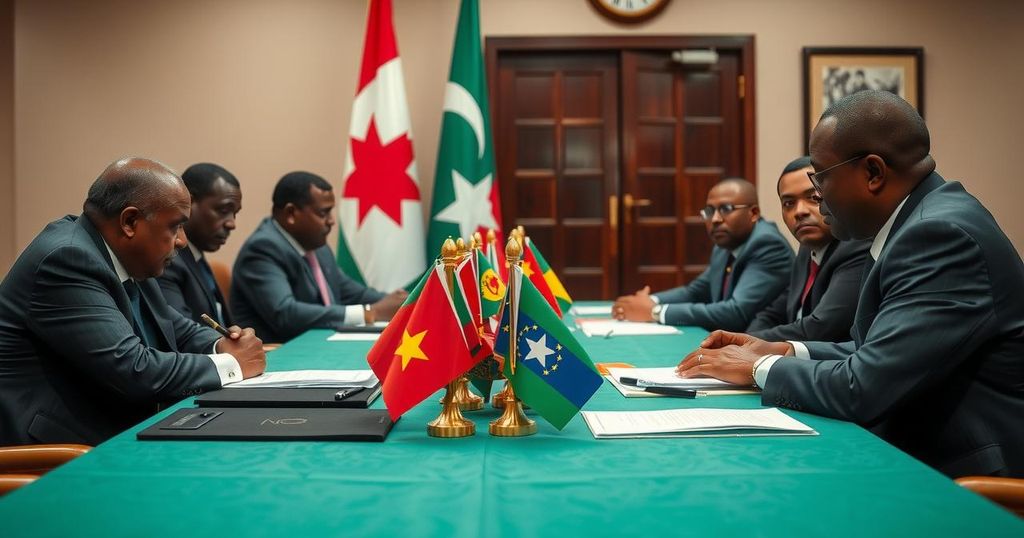Somalia’s President Hassan Sheikh Mohamud visited Ethiopia to strengthen ties following a peace deal mediated by Turkiye, aimed at reducing long-standing tensions aggravated by Ethiopia’s recognition of Somaliland. The visit underscores renewed cooperation, yet uncertainties over maritime access and Ethiopia’s prior agreements with Somaliland persist. Somalia also aligns with Egypt and Eritrea, highlighting regional security concerns regarding Ethiopia’s ambitions.
On Saturday, Somalia’s President Hassan Sheikh Mohamud made an official visit to Ethiopia as part of a concerted effort to enhance diplomatic relations following a recent peace agreement. This agreement, which was reached last month with Ethiopian Prime Minister Abiy Ahmed and facilitated by Turkiye, aims to alleviate tensions historically associated with Ethiopia’s recognition of Somaliland’s independence in exchange for strategic access to maritime routes. President Mohamud’s visit, initiated by Prime Minister Abiy’s request, signifies a commitment to a new cooperative phase between the two nations, despite ongoing uncertainties regarding the implementation of the peace accord and outstanding territorial issues.
While Ethiopian officials, including President Abiy, are optimistic about potential access to the sea as a result of recent negotiations, the specific modalities of this access remain unclear. Additionally, the prior agreement between Ethiopia and Somaliland creates complexities that need to be addressed to solidify relations comprehensively. Further complicating matters, Somalia’s Foreign Minister Ahmed Moalim Fiqi recently met with counterparts from Egypt and Eritrea, where the three nations expressed mutual concerns regarding Ethiopia’s regional ambitions. Egypt’s Foreign Minister Badr Abdelatty articulated their stance by stating, “The Red Sea and its security is subject only to the will of the countries on its coast, and it is absolutely unacceptable for any country not bordering the Red Sea to have a presence, whether military, naval or otherwise.”
The evolving geopolitical landscape in the Horn of Africa highlights a significant shift in regional alliances, particularly with Egypt, Eritrea, and Somalia forming a coalition in response to Ethiopia’s strategic maneuvers. These developments coincide with strengthened military cooperation between Egypt and Somalia, advocating for a collective approach to combat insurgent threats within Somalia’s borders.
The Horn of Africa is characterized by complex geopolitical dynamics, particularly between Ethiopia and Somalia, driven by historical grievances and aspirations for maritime access. Ethiopia, a landlocked country, has sought to gain access to the sea, which has intensified friction with Somalia, especially after a controversial deal with Somaliland. Nevertheless, recent diplomatic efforts mediated by Turkiye appear to foster a renewed commitment to peace and cooperation between the nations, amidst underlying tensions and unresolved issues about territorial sovereignty.
In summary, President Hassan Sheikh Mohamud’s visit to Ethiopia represents a significant step towards reconciliation and collaborative governance in the Horn of Africa. However, persistent uncertainties surrounding maritime access for Ethiopia and the implications of its prior agreements with Somaliland remain critical issues to address. Furthermore, Somalia’s alignment with Egypt and Eritrea indicates a broader strategic posture that may shape future interactions in the region. The path forward will depend on transparent dialogues and effective implementation of diplomatic agreements.
Original Source: www.arabnews.com






